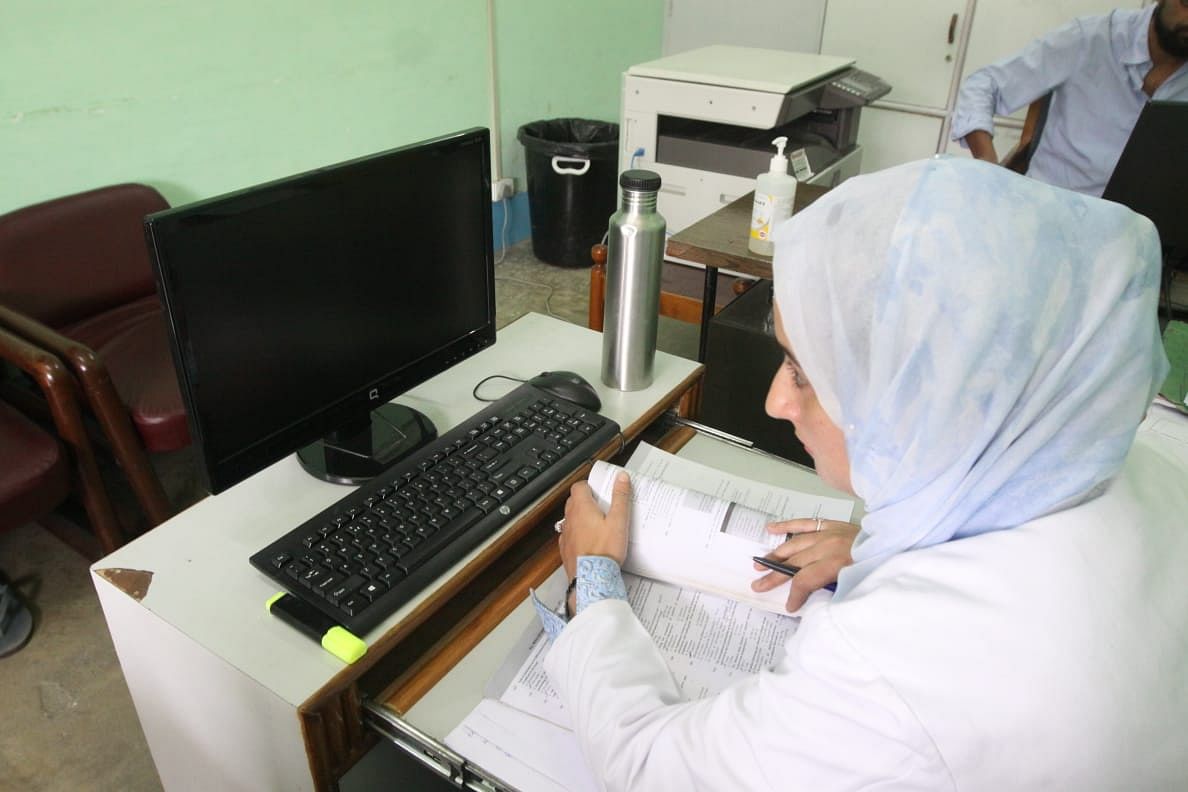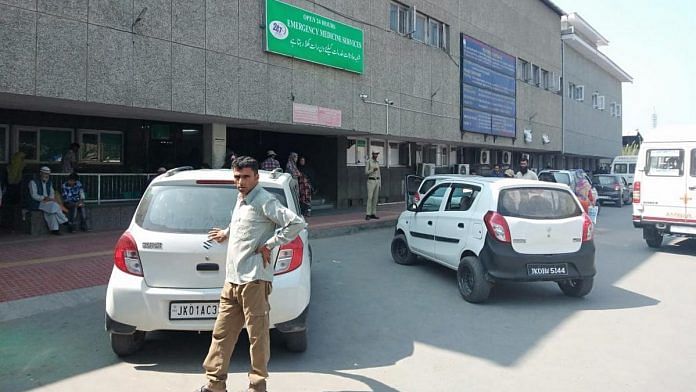Srinagar: Ayushman Bharat, the Modi government’s flagship health insurance scheme for India’s poor, is proving to be one of the primary casualties of the internet lockdown in Jammu & Kashmir.
There are 155 public and private hospitals empanelled under the scheme in J&K. In the absence of internet connectivity to verify beneficiaries, many hospitals in Kashmir, including the two biggest government-run establishments, have put fresh registrations under Ayushman Bharat aka Pradhan Mantri Jan Arogya Yojana (PM-JAY) on hold, ThePrint has learnt.
They are also going slow on admitting registered patients because the hospitals have failed to secure reimbursements from the government for the last two months, and they’ve had to shell out lakhs from their own budget for treatments, according to people familiar with the matter. At other times, beneficiaries are being made to pay bills on the promise that they will be reimbursed once the hospitals receive money from the government.
Also Read: Modi govt plans biometrics to fight ‘ghost patients’ of Ayushman Bharat
Thrown into chaos
Ayushman Bharat, which completed a year this month, promises an annual health cover of Rs 5 lakh to poor families at no premium. It aims to reduce out-of-pocket expenditure on hospital visits.
Beneficiaries of the scheme receive a ‘golden card’, which has all their details. When a beneficiary first visits a hospital, the hospital validates their identity, via the Aadhaar number, against the Ayushman Bharat database. Once this is done, a patient is considered ‘registered’ and the hospital can start processing his/her admission.
Patients requiring frequent hospitalisation, like those on dialysis, don’t require the registration process during subsequent admissions.
Internet is also crucial to the scheme because it’s only after the beneficiary’s records are uploaded online that claims raised by hospitals can be processed and reimbursed by the government.
The scheme guidelines mandate that records have to be uploaded by the hospital within seven days of admission.
Hospitals in Kashmir have broadband connections, but they haven’t been working in light of the lockdown, which was imposed after the scrapping of Article 370 on 5 August and is set to complete two months next week. This has thrown the entire Ayushman Bharat process into chaos.
Numbers down
The total admissions in Ayushman Bharat-empanelled government and private hospitals stood at 6,121 in June, which increased to 7,063 in July. The number came down to almost 5,000 between 5 August and 5 September, according to the J&K nodal agency for Ayushman Bharat.
According to a doctor at the facility, the Sher-i-Kashmir Institute of Medical Sciences (SKIMS), one of the biggest government hospitals in Kashmir, has not registered a single new patient under Ayushman Bharat since 5 August, and admitted only a few of the registered ones.
At Shri Maharaja Hari Singh Medical College (SMHS), another big government tertiary care hospital, admissions are down by more than 50 per cent.
Khyber Medical Institute, one of the biggest private hospitals, ran free treatment for 22 days but is now charging Ayushman Bharat beneficiaries after allegedly running up dues to the tune of Rs 1 crore.
According to doctors, a similar situation exists in other government and private hospitals too.

‘Offline validation drives up fraud risk’
A senior doctor at SKIMS said that, since 5 August, there had been nearly zero admissions at the hospital under the PM-JAY.
“We can process cases offline as directed by the government but how do we know that the individual does not have a fake card?” the doctor added. “There have been such cases in the past but we could easily detect them by validating the data online. We can’t do that now.”
In the offline mode, hospitals first treat patients, upload data and raise bills later, when internet services resume. But hospitals are reluctant to use this mode as, according to them, it increases the risk of fraudulent bills.
After landline services were restored in mid-August, the government issued a circular dated 28 August that directed hospitals to get telephonic approvals for Ayushman Bharat packages requiring pre-authorisation. But hospitals say the process is too time-consuming.
“With only limited landlines functioning, it takes ages for a call to get through,” said a senior doctor at SMHS Hospital.
Dr Nazir H. Chowdhary, the medical superintendent at SMHS Hospital, told ThePrint that there had been a 50 per cent dip in hospital admissions under the PM-JAY since 5 August. “After government instructions, we have started processing cases offline. No patient is being denied treatment,” he added.
Asked about the hospitals’ concerns, Bhupinder Kumar, the CEO of Ayushman Bharat in J&K, said only the 10 districts of Kashmir were facing an issue.
“We have given clear directions to all hospitals to process cases offline,” he added. “They can upload patient documents later. Our instructions are clear that no patient should be denied healthcare under PM-JAY.”
For example, Kumar said, the district hospital in Pulwama had made 162 admissions between 5 August and 5 September, all in offline mode.
Hospitals have also been told that they can use the intranet facility of Bajaj Allianz, the insurance agency handling PM-JAY claims, to upload insurance-related documents.
Also Read: Modi govt’s Ayushman Bharat likely to cover over 90 cr people — 70% of total population
Private hospitals face the brunt too
Shahnawaz Amin, the administrator at Khyber Medical Institute, said the hospital funded patient treatment under PM-JAY for 22 days after 5 August.
But the hospital was forced to suspend free treatment from 27 August amid mounting dues, he added.
“We informed the patients that they would be reimbursed once the pending dues are cleared by the government,” Amin said. “We have also informed the state nodal agency.”
According to authorities at the facility, Khyber’s dues had reached Rs 1 crore. “Even our claims for June and July have not been processed. It was becoming a challenge for us to continue providing free services under the scheme,” Amin said. “We are also not registering any new cases.”
The PM-JAY was launched in J&K in December 2018 and hospitals in Kashmir were among the top performers in the country prior to 5 August. In J&K, 6.13 lakh poor and vulnerable families are entitled for a health cover under the PM-JAY. So far, 11.3 lakh individuals have been given the golden card.
Also Read: J&K has 2 sets of cellphone numbers — those on ‘white list’ work, ones on ‘black list’ don’t



